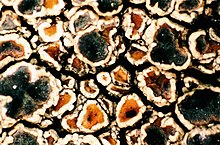Megasporaceae are a family of fungi belonging to the order Pertusariales.[1] Taxa are lichenized with green algae, and grow on rocks, often in maritime climates close to fresh water.[2] Phylogenetic analysis has shown that this family is related to the Pertusariaceae, another family of lichens.[3] The genus Aspicilia was moved here from the Hymeneliaceae.[4]
| Megasporaceae | |
|---|---|

| |
| Aspicilia calcarea | |
| Scientific classification | |
| Domain: | Eukaryota |
| Kingdom: | Fungi |
| Division: | Ascomycota |
| Class: | Lecanoromycetes |
| Order: | Pertusariales |
| Family: | Megasporaceae Lumbsch (1994) |
| Type genus | |
| Megaspora (Clauzade & Cl.Roux) Hafellner & V.Wirth (1987)
| |
Genera
editGenera of this family include:
- Aspicilia A.Massal. (1852) – ca. 200 spp.
- Aspiciliella M.Choisy (1932) – 2 spp.
- Circinaria Link (1809) – 31 spp.
- Lobothallia (Clauzade & Cl.Roux) Hafellner (1991) – 17 spp.
- Megaspora (Clauzade & Cl.Roux) Hafellner & V.Wirth (1987) – 4 spp.
- Oxneriaria S.Y.Kondr. & Lőkös (2017)[5] – 9 spp.
- Sagedia Ach. (1809) – 12 spp.
- Teuvoa Sohrabi & S.D.Leav (2013)[6] – 5 spp.
References
edit- ^ Wijayawardene, Nalin; Hyde, Kevin; Al-Ani, Laith Khalil Tawfeeq; Somayeh, Dolatabadi; Stadler, Marc; Haelewaters, Danny; et al. (2020). "Outline of Fungi and fungus-like taxa". Mycosphere. 11: 1060–1456. doi:10.5943/mycosphere/11/1/8. hdl:11336/151990.
- ^ Fungal Families of the World. Wallingford, UK: CABI. 2007. p. 202. ISBN 978-0-85199-827-5.
- ^ Schmitt, I.; Yamamoto, Y.; Lumbsch, H.T. (2006). "Phylogeny of Pertusariales (Ascomycotina): Resurrection of Ochrolechiaceae and new circumscription of Megasporaceae". Journal of the Hattori Botanical Laboratory. 100: 753–764.
- ^ Lumbsch, T.H.; Feige, G.B.; Schmitz, K.E. (1994). "Systematic studies in the Pertusariales. I: Megasporaceae, a new family of lichenized ascomycetes". Hattori Shokubutsu Kenkyujo Hokoku. 75: 295–304.
- ^ Haji Moniri, M.; Gromakova, A.B.; Lőkös, L.; Kondratyuk, S.Y. (2017). "New members of the Megasporaceae (Pertusariales, lichen-forming Ascomycota): Megaspora iranica spec. nova and Oxneriaria gen. nova" (PDF). Acta Botanica Hungarica. 59 (3–4): 343–370. doi:10.1556/034.59.2017.3-4.5. S2CID 90704563.
- ^ Sohrabi, Mohammad; Leavitt, Steven D.; Rico, Víctor J.; Halici, Mehmet G.; Shrestha, Gajendra; Stenroos, Soili (2013). "Teuvoa, a new lichen genus in Megasporaceae (Ascomycota: Pertusariales), including Teuvoa junipericola sp. nov". The Lichenologist. 45 (3): 347–360. doi:10.1017/S0024282913000108. S2CID 84530559.